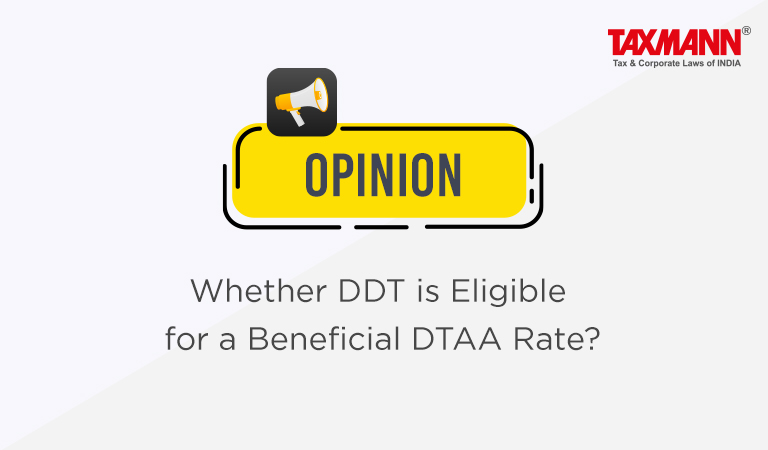[Opinion] Whether DDT is Eligible for a Beneficial DTAA Rate?
- Blog|News|International Tax|
- 3 Min Read
- By Taxmann
- |
- Last Updated on 16 May, 2023

Surender Bisht & Ashish Chadha – [2023] 150 taxmann.com 248 (Article)
The Special Bench of the Income Tax Appellate Tribunal (‘Tribunal’) has recently pronounced a landmark decision on the issue as to whether the Dividend Distribution Tax (‘DDT’) imposed under Section 115-O of the Income-tax Act, 1961 (‘Act’) ought to be restricted to the dividend withholding tax rate stipulated in the applicable Double Taxation Avoidance Agreement (‘DTAA’). The Tribunal has held that DDT is an additional tax levied on the company and not on the shareholder and accordingly, the benefit of lower tax rate as per the relevant DTAA for taxation of dividend will not be available in case of non-resident shareholders, except where specifically agreed upon.
The issue involves very high stakes for the taxpayers as well as the Indian tax authorities. The Special Bench’s decision is likely to fuel even more intense litigation.
Facts before the Tribunal
- The taxpayer, an Indian company, declared/ paid dividend during the previous year (AY 2016-17) and one of the shareholders, to whom dividend was paid, was a non-resident (tax resident of France).
- The provisions of Section 115-O of the Act applicable for the year under consideration provided that the taxpayer was required to pay additional income tax (DDT) on the amount of dividend declared, distributed, or paid by way of dividend.
- Given that the rate of tax on dividend income prescribed in the DTAA is less than the rate prescribed in Section 115-O of the Act, the taxpayer raised a plea before the Tribunal that the rate of DDT in terms of Section 115-O of the Act cannot be more than the rate at which dividend can be taxed in the hands of the non-resident shareholder in terms of the DTAA between India and France.
- In support of the above plea, the taxpayer took support from the following decisions:
— Delhi Tribunal in the case of Giesecke & Devrient India (P.) Ltd. v. Addl. CIT [2020] 120 taxmann.com 338;
— Kolkata Tribunal in the case of Dy. CIT v. Indian Oil Petronas (P.) Ltd. [2021] 127 taxmann.com 389/189 ITD 490.
- While dealing with the case of the taxpayer, the Mumbai Bench of the Tribunal doubted the correctness of the afore-mentioned decisions. The reasons for doubting the correctness were as follows:
— Hon’ble Supreme Court in the case of Godrej & Boyce Mfg. Co. Ltd. v. Dy. CIT [2017] 81 taxmann.com 111/247 Taxman 361/394 ITR 449 has observed that payment of DDT under Section 115-O of the Act does not discharge the tax liability of the shareholders and thus, DDT is not a tax paid by or on behalf of the shareholder. The Mumbai Bench observed that the Delhi Tribunal did not have any occasion to deal with this judicial precedent from the Hon’ble Supreme Court.
— The Mumbai Bench was of the view that the inference drawn by the taxpayer based on the decision of the Hon’ble Supreme Court in the case of Union of India v. Tata Tea Co. Ltd. [2017] 85 taxmann.com 346/251 Taxman 10/398 ITR 260 is misplaced, as the said decision deals with the constitutional validity of the provisions of Section 115-O of the Act and does not overrule, or even remotely deal with the instant issue.
— No tax credits are envisaged in the hands of the shareholders in respect of DDT paid by the Company in which shares are held. The DDT, thus, cannot be equated with a tax paid by or on behalf of a shareholder in receipt of such dividend.
— Wherever the contracting states to a DTAA intended to extend the treaty protection to DDT, it has been so specifically provided in the DTAA itself, such as in DTAA between India and Hungary.
Click Here To Read The Full Article
Disclaimer: The content/information published on the website is only for general information of the user and shall not be construed as legal advice. While the Taxmann has exercised reasonable efforts to ensure the veracity of information/content published, Taxmann shall be under no liability in any manner whatsoever for incorrect information, if any.

Taxmann Publications has a dedicated in-house Research & Editorial Team. This team consists of a team of Chartered Accountants, Company Secretaries, and Lawyers. This team works under the guidance and supervision of editor-in-chief Mr Rakesh Bhargava.
The Research and Editorial Team is responsible for developing reliable and accurate content for the readers. The team follows the six-sigma approach to achieve the benchmark of zero error in its publications and research platforms. The team ensures that the following publication guidelines are thoroughly followed while developing the content:
- The statutory material is obtained only from the authorized and reliable sources
- All the latest developments in the judicial and legislative fields are covered
- Prepare the analytical write-ups on current, controversial, and important issues to help the readers to understand the concept and its implications
- Every content published by Taxmann is complete, accurate and lucid
- All evidence-based statements are supported with proper reference to Section, Circular No., Notification No. or citations
- The golden rules of grammar, style and consistency are thoroughly followed
- Font and size that’s easy to read and remain consistent across all imprint and digital publications are applied



 CA | CS | CMA
CA | CS | CMA
